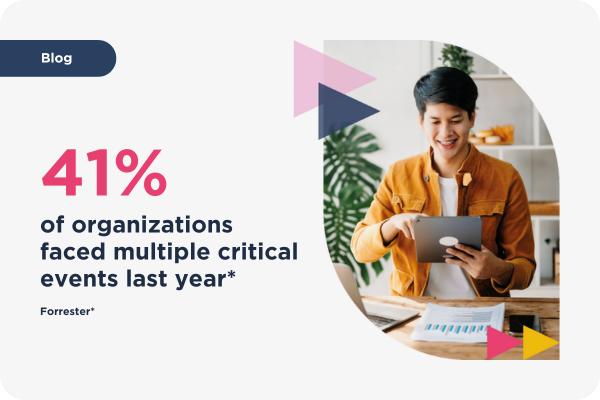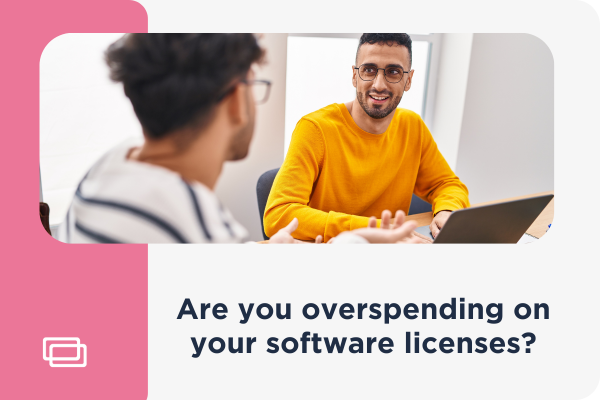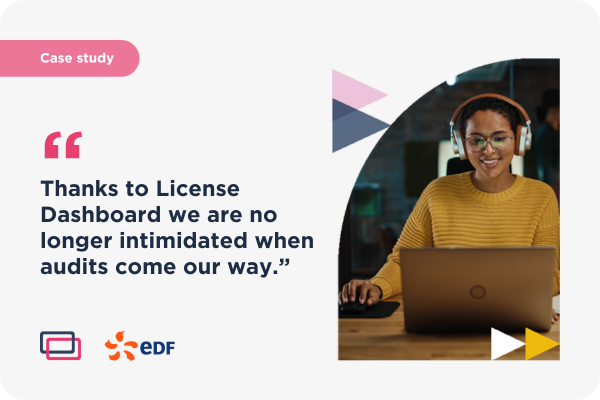At License Dashboard we are, and always have been passionate about creating and maintaining a diverse place of work. One of our employees has been working with the Women in Technology Community by building a space where women can support each other, share advice and work to narrow the gender gap.
We asked some esteemed women within the IT industry to tell us a bit about their experiences within the workplace. Here’s what Neela Mistry-Bradshaw of Red Hat said:
When did you first start in the IT industry and what drew you to it?
After spending five years working in a mixture of marketing research and analytical roles both in the UK and abroad, I got my first break in the tech industry in 2001 as a UK and European Marketing Manager, based in the UK but commuting to the HQ in Paris. Unfortunately, the company was having financial difficulties and my job was short-lived but I got a flavor of working in tech and wanted to explore how I could use my creativity in a business environment.
The tech industry was dynamic and challenging so I wanted to see how I could mix things up with marketing from a different perspective to the traditional product/feature-based marketing which was dominant in those days and still is in some areas. I soon moved into a Corporate and Channel Marketing Manager role with a start-up in the Software Asset Management industry where I had the autonomy to experiment with campaigns that were more creative but were underlined with clear messaging which resonated with the specific audiences I was targeting.
As a woman, have you faced any challenges within working environments?
As a working mum of two teenage girls, I’ve faced a few challenges over the years. Initially I was very worried about my career when I fell pregnant with my first child as I really needed flexibility with childcare, luckily, I had a very understanding male CEO who told me that family came first and work second so I managed to juggle the two and still retain a managerial position!
Surprisingly it was a female sales director who was the challenge. Whilst pregnant there are numerous visits to the GP as part of your well-being and on one occasion, on return from the GP, she mentioned to me that if I was to have more and more time off with pregnancy-related illnesses then I should leave immediately. An incredulous statement considering I hadn’t taken any time off for illness and was on top of my job! So being pregnant or a mother doesn’t make you incompetent at your job nor does it mean that you can’t be a leader or a tech professional – you can! Unfortunately, society defines who we are allowed to be and this starts at an early age.
Women should empower and support one another into high positions.
The latter example amongst others that I experienced at first-hand with female managers all point to the same challenge across most industries and not just tech, the fact that women don’t always support and empower one-another to succeed! It’s hard enough to feel that we must do twice the work to be recognized or promoted, without having to prove to a female boss that you can do the job better than some of your male colleagues. Some women in high positions feel threatened by female colleagues that are younger or smarter than them and are reluctant to help them progress their careers. This is truly a sad state of affairs. Women should empower and support one another into high positions.
Another challenge which I’ve faced on a number of occasions is working with male colleagues, namely sales directors and a couple of CEOs who have had an issue with taking onboard advice or suggestions from female co-workers unless they are seen to be ‘difficult’ and then they have to listen to them in fear of being shown up! Often dismissing your advice or judgement, unwilling to collaborate or worse still, giving you a voice but not listening to it, are all too common. Working for an ‘open organization’ where everyone has a voice, helps to overcome some of these issues.
It’s now well known that a lot of industries have been highlighted due to pay gaps between men and women, do you think this is the same within the IT industry?
Whilst I feel the IT industry on average pays higher salaries when compared to other industries (and I think this is largely due to the shortage of skilled professionals in some areas), the gender pay gap is no different in this industry to any other. When we look at the global average for annual earnings for men and women around the world, women earn 50 – 70% of what men earn for the same job (figures are according to the World Economic Forum’s Income Gender Gap Index in 2018), so there’s still some way to go before the gap will start narrowing. Some countries, (namely those in the Nordics), lead the way on gender pay equality and we can do more to learn from them.
Since 2017, in the UK, the Equality and Human Rights Commission (EHRC) has brought in a regulation for all organizations with more than 250 employees to publish and report specific figures about their gender pay gap. Any employer failing to report on time or reporting inaccurate data will be in breach of the regulations and risk facing legal action. This definitely is a step in the right direction but organizations will need to do more to deliver equality and transparency in the workplace – they need to start treating women as a valuable resource and remunerate working mothers or part-time female workers for the work they do and the value they bring rather than the hours they are contracted to work.
The gender pay gap challenges don’t just stop there, the impact of this also has repercussions later in life at retirement age, on the gender wealth gap. According to recent research, women in their 60s have an average of £51,100 in their private pension pots, while men have £156,500. Women are at a disadvantage from an early age with everyone else around them deciding that they are worth less than their male counterparts.
In recent years there has been an influx of women in all workplaces, but it’s not equal to men, I read somewhere that men are 30% more likely to be promoted to a managerial position than women.
What can organizations do to prevent discrimination and maintain equality when looking at hiring, salaries and promotions?
Women need to be confident that they are being supported by employers in taking up leadership positions and throughout their role.
Firstly, organizations need to employ more women, secondly, they need to widen the type of opportunities that have traditionally been offered to men, ensuring women are also welcome to apply for these roles. At the heart of this is mentoring and coaching, providing the right training to ensure women are set up to succeed rather than to fail. Employers also need to provide more flexibility to women who are working mothers or part-time carers and workers. Many feel they are unable to go for managerial roles due to childcare, personal and family restrictions. Women need to be confident that they are being supported by employers in taking up leadership positions and throughout their role.
However, let’s be mindful that we also need to help ourselves and change our own mindset. Women can be their own worst enemy and often do not apply for senior roles where they feel they cannot meet 100% of the job criteria or are likely to fail, whereas men will apply even if they only meet 60%. Women are losing out on some amazing roles, we just need to be more confident in our own abilities and believe in our own potential to succeed!
What resources and support are available for women in IT?
I’m lucky in that my current employer has a ‘women in leadership community’ that helps women to promote/exchange ideas and experiences, offers networking opportunities, educational and cultural programs, and encourages members to grow as leaders and make a positive contribution to the next generation of women leaders in open source technology.
To be honest, I haven’t explored resources or support available to women in IT but I recently went to the ‘Women in Business Expo’ in Farnborough where my current employer sponsored a stand in the ‘Women in Tech’ zone. These events are great in helping to educate women about the opportunities available to them in IT and gaining support from like-minded individuals.
However, I do feel that the best first-hand knowledge and support can be gained from fellow female colleagues. Women need to start supporting and empowering one another, something we don’t do very often. Recently, empowering a female colleague to succeed has led me to re-evaluate my own capabilities and re-think how I would like my career to develop. Often, we focus too much on what we can’t do, so my focus has shifted to what I can do and do better than my male counterparts.
What’s the biggest lesson you have learnt as a woman in the IT industry?
Having a creative mind enables me to think out of the box and offer up different solutions to those of my male counterparts
As a woman in the IT industry I’ve learnt to bring a different perspective to my work – in other words understanding the world from different viewpoints, having a creative mind enables me to think out of the box and offer up different solutions to those of my male counterparts. My biggest strength is communication and I use this to my full advantage! If you are open, collaborative and a real team player, you can bring people with you and succeed at anything.
What is your favorite part of working in the IT industry?
The IT industry is vast, and I love the fact that it’s forever evolving and fast-paced, there’s so much to learn and it offers up new and amazing opportunities every day. It is the most dynamic of industries you can work in and it is up to you to drive your destiny to be an expert in any area – the possibilities are endless. The IT industry is your oyster!
What’s the biggest professional challenge you have faced and how did you overcome it?
For those who know me well, know that I’m quite chatty and happy go lucky!. Despite this, having the confidence to voice my opinion in a professional environment has actually been my greatest challenge. Being taken seriously in business as a female and as an asian female is a hard mix and has often left me feeling that I should have spoken up in some situations if I’d had the confidence to do so.
In these situations, my mantra has been to prove myself by doing rather than by talking, especially when my voice is not being heard. Speaking up for myself, defending my decisions and believing in myself and what is right has been difficult due to my lack of confidence but as I’ve gotten older, I now have a much more determined attitude to speak up. My years of experience in tech has given me the confidence to express myself and voice my opinion when I know I’m right and now I’m able to argue my case in a more confident manner using facts and evidence where required.
Do you have any advice or words of wisdom to women starting out in the IT industry?
Don’t be afraid to take risks, be true to yourself and have the courage to do what you think is right for you. Put yourself forward for those top roles and keep trying until you get there. As a woman you have a lot to offer and if you know you can do the job then do yourself a favor and go for it and even ask for that higher salary if you know you are worth it – they can only say no, but you won’t know until you’ve tried – Good luck!
Keep an eye out for the next blog in the Women in Technology series and if you would like to take part, please don’t hesitate to get in contact.


























